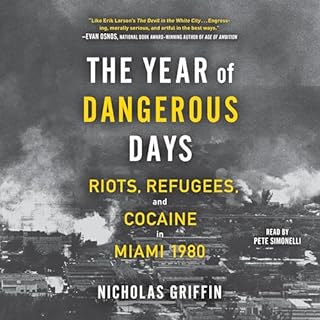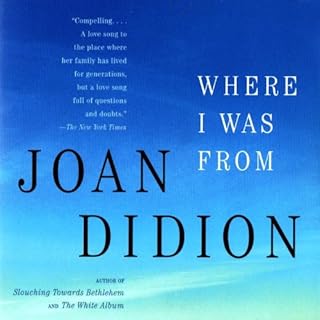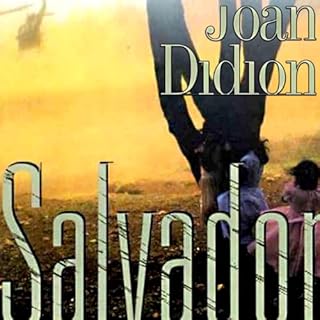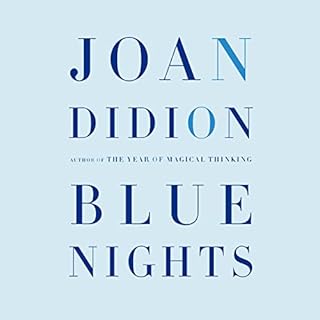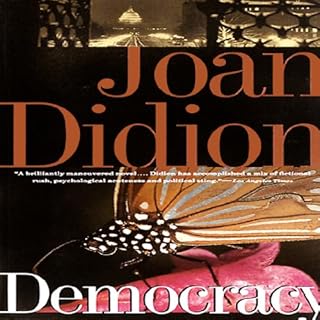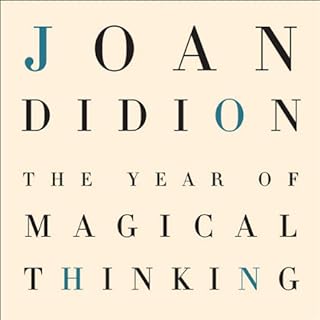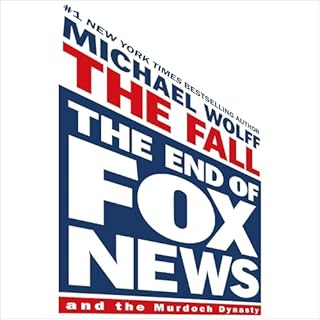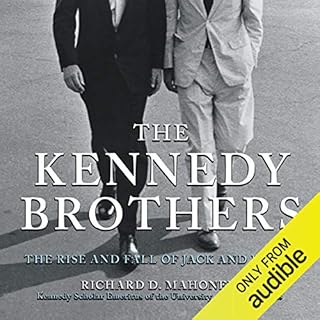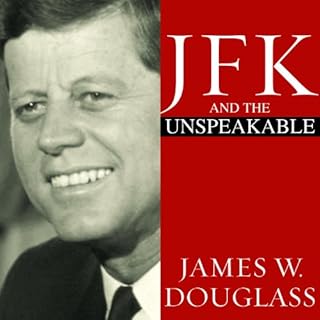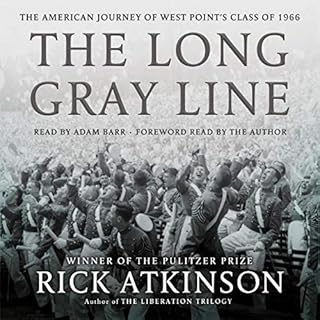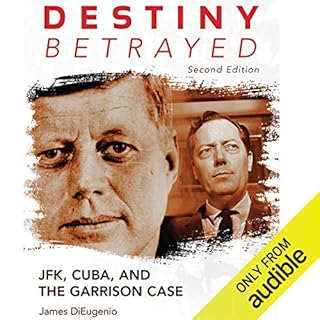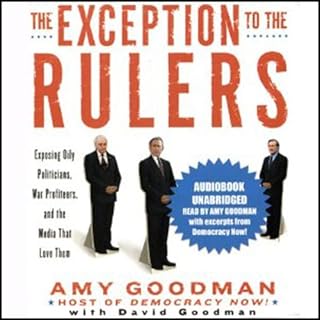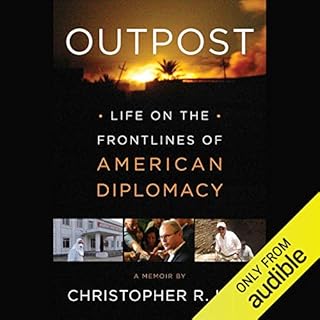
Miami
No se pudo agregar al carrito
Add to Cart failed.
Error al Agregar a Lista de Deseos.
Error al eliminar de la lista de deseos.
Error al añadir a tu biblioteca
Error al seguir el podcast
Error al dejar de seguir el podcast
 Exclusivo para miembros Prime: ¿Nuevo en Audible? Obtén 2 audiolibros gratis con tu prueba.
Exclusivo para miembros Prime: ¿Nuevo en Audible? Obtén 2 audiolibros gratis con tu prueba.Compra ahora por $19.95
No default payment method selected.
We are sorry. We are not allowed to sell this product with the selected payment method
-
Narrado por:
-
Jennifer Van Dyck
-
De:
-
Joan Didion
Acerca de esta escucha
It is where Fidel Castro raised money to overthrow Batista and where two generations of Castro's enemies have raised armies to overthrow him, so far without success. It is where the bitter opera of Cuban exile intersects with the cynicism of U.S. foreign policy. It is a city whose skyrocketing murder rate is fueled by the cocaine trade, racial discontent, and an undeclared war on the island 90 miles to the south. As Didion follows Miami's drift into a Third World capital, she also locates its position in the secret history of the Cold War, from the Bay of Pigs to the Reagan doctrine and from the Kennedy assassination to the Watergate break-in.
Miami is not just a portrait of a city, but a masterly study of immigration and exile, passion, hypocrisy, and political violence.
©1987 Joan Didion (P)2012 Audible, Inc.Los oyentes también disfrutaron...
-
The Year of Dangerous Days
- Riots, Refugees, and Cocaine in Miami 1980
- De: Nicholas Griffin
- Narrado por: Pete Simonelli
- Duración: 9 h y 20 m
- Versión completa
-
General5 out of 5 stars 136
-
Narración:5 out of 5 stars 115
-
Historia5 out of 5 stars 116
In the tradition of The Wire, the “utterly absorbing” (The New York Times) story of the cinematic transformation of Miami, one of America’s bustling cities - rife with a drug epidemic, a burgeoning refugee crisis, and police brutality - from journalist and award-winning author Nicholas Griffin.
-
5 out of 5 stars
-
Forty Years Ago or Yesterday?
- De Anka en 07-20-20
De: Nicholas Griffin
-
Where I Was From
- De: Joan Didion
- Narrado por: Gabrielle De Cuir
- Duración: 6 h y 28 m
- Versión completa
-
General4.5 out of 5 stars 169
-
Narración:4.5 out of 5 stars 144
-
Historia4.5 out of 5 stars 141
In her moving and insightful new book, Joan Didion reassesses parts of her life, her work, her history and ours. A native Californian, Didion applies her scalpel-like intelligence to the state’s ethic of ruthless self-sufficiency in order to examine that ethic’s often tenuous relationship to reality. Combining history and reportage, memoir and literary criticism, Where I Was From explores California’s romances with land and water; its unacknowledged debts to railroads, aerospace, and big government; the disjunction between its code of individualism and its fetish for prisons.
-
4 out of 5 stars
-
California belongs to Joan Didion.
- De Darwin8u en 11-04-15
De: Joan Didion
-
Salvador
- De: Joan Didion
- Narrado por: Eileen Stevens
- Duración: 2 h y 55 m
- Versión completa
-
General4 out of 5 stars 70
-
Narración:4 out of 5 stars 55
-
Historia4 out of 5 stars 54
The place is El Salvador in 1982, at the ghastly height of its civil war. The writer is Joan Didion, who delivers an anatomy of that country's particular brand of terror - its mechanisms, rationales, and intimate relation to United States foreign policy. As ash travels from battlefields to body dumps, interviews a puppet president, and considers the distinctly Salvadoran grammar of the verb "to disappear," Didion gives us a book that is germane to any country in which bloodshed has become a standard tool of politics.
-
4 out of 5 stars
-
Didion writes like an orthopedic surgeon cuts
- De Darwin8u en 01-29-14
De: Joan Didion
-
Blue Nights
- A Memoir
- De: Joan Didion
- Narrado por: Kimberly Farr
- Duración: 4 h y 21 m
- Versión completa
-
General4.5 out of 5 stars 662
-
Narración:4.5 out of 5 stars 569
-
Historia4.5 out of 5 stars 569
From one of our most powerful writers, a work of stunning frankness about losing a daughter. Richly textured with bits of her own childhood and married life with her husband, John Gregory Dunne, and daughter, Quintana Roo, this new book by Joan Didion examines her thoughts, fears, and doubts regarding having children, illness, and growing old.
-
3 out of 5 stars
-
Twilights turn Long and Blue
- De Darwin8u en 01-02-17
De: Joan Didion
-
South and West
- From a Notebook
- De: Joan Didion
- Narrado por: Kimberly Farr, Nathaniel Rich
- Duración: 2 h y 51 m
- Versión completa
-
General4 out of 5 stars 110
-
Narración:4 out of 5 stars 91
-
Historia4 out of 5 stars 94
Joan Didion has always kept notebooks: of overheard dialogue, observations, interviews, drafts of essays and articles—and here is one such draft that traces a road trip she took with her husband, John Gregory Dunne, in June 1970, through Louisiana, Mississippi, and Alabama. She interviews prominent local figures, describes motels, diners, a deserted reptile farm, a visit with Walker Percy, a ladies' brunch at the Mississippi Broadcasters' Convention.
-
3 out of 5 stars
-
"Notes" Are Not a Book
- De Carole T. en 03-11-17
De: Joan Didion
-
Let Me Tell You What I Mean
- An Essay Collection
- De: Joan Didion
- Narrado por: Kimberly Farr, Hilton Als
- Duración: 4 h y 5 m
- Versión completa
-
General4.5 out of 5 stars 163
-
Narración:4.5 out of 5 stars 134
-
Historia4.5 out of 5 stars 131
From one of our most iconic and influential writers, the award-winning author of The Year of Magical Thinking: a timeless collection of mostly early pieces that reveal what would become Joan Didion's subjects, including the press, politics, California robber barons, women, and her own self-doubt. With a forward by Hilton Als, these 12 pieces from 1968 to 2000, never before gathered together, offer an illuminating glimpse into the mind and process of a legendary figure.
-
4 out of 5 stars
-
Didion deserves a better narrator
- De Pamela en 02-03-21
De: Joan Didion
-
The Year of Dangerous Days
- Riots, Refugees, and Cocaine in Miami 1980
- De: Nicholas Griffin
- Narrado por: Pete Simonelli
- Duración: 9 h y 20 m
- Versión completa
-
General5 out of 5 stars 136
-
Narración:5 out of 5 stars 115
-
Historia5 out of 5 stars 116
In the tradition of The Wire, the “utterly absorbing” (The New York Times) story of the cinematic transformation of Miami, one of America’s bustling cities - rife with a drug epidemic, a burgeoning refugee crisis, and police brutality - from journalist and award-winning author Nicholas Griffin.
-
5 out of 5 stars
-
Forty Years Ago or Yesterday?
- De Anka en 07-20-20
De: Nicholas Griffin
-
Where I Was From
- De: Joan Didion
- Narrado por: Gabrielle De Cuir
- Duración: 6 h y 28 m
- Versión completa
-
General4.5 out of 5 stars 169
-
Narración:4.5 out of 5 stars 144
-
Historia4.5 out of 5 stars 141
In her moving and insightful new book, Joan Didion reassesses parts of her life, her work, her history and ours. A native Californian, Didion applies her scalpel-like intelligence to the state’s ethic of ruthless self-sufficiency in order to examine that ethic’s often tenuous relationship to reality. Combining history and reportage, memoir and literary criticism, Where I Was From explores California’s romances with land and water; its unacknowledged debts to railroads, aerospace, and big government; the disjunction between its code of individualism and its fetish for prisons.
-
4 out of 5 stars
-
California belongs to Joan Didion.
- De Darwin8u en 11-04-15
De: Joan Didion
-
Salvador
- De: Joan Didion
- Narrado por: Eileen Stevens
- Duración: 2 h y 55 m
- Versión completa
-
General4 out of 5 stars 70
-
Narración:4 out of 5 stars 55
-
Historia4 out of 5 stars 54
The place is El Salvador in 1982, at the ghastly height of its civil war. The writer is Joan Didion, who delivers an anatomy of that country's particular brand of terror - its mechanisms, rationales, and intimate relation to United States foreign policy. As ash travels from battlefields to body dumps, interviews a puppet president, and considers the distinctly Salvadoran grammar of the verb "to disappear," Didion gives us a book that is germane to any country in which bloodshed has become a standard tool of politics.
-
4 out of 5 stars
-
Didion writes like an orthopedic surgeon cuts
- De Darwin8u en 01-29-14
De: Joan Didion
-
Blue Nights
- A Memoir
- De: Joan Didion
- Narrado por: Kimberly Farr
- Duración: 4 h y 21 m
- Versión completa
-
General4.5 out of 5 stars 662
-
Narración:4.5 out of 5 stars 569
-
Historia4.5 out of 5 stars 569
From one of our most powerful writers, a work of stunning frankness about losing a daughter. Richly textured with bits of her own childhood and married life with her husband, John Gregory Dunne, and daughter, Quintana Roo, this new book by Joan Didion examines her thoughts, fears, and doubts regarding having children, illness, and growing old.
-
3 out of 5 stars
-
Twilights turn Long and Blue
- De Darwin8u en 01-02-17
De: Joan Didion
-
South and West
- From a Notebook
- De: Joan Didion
- Narrado por: Kimberly Farr, Nathaniel Rich
- Duración: 2 h y 51 m
- Versión completa
-
General4 out of 5 stars 110
-
Narración:4 out of 5 stars 91
-
Historia4 out of 5 stars 94
Joan Didion has always kept notebooks: of overheard dialogue, observations, interviews, drafts of essays and articles—and here is one such draft that traces a road trip she took with her husband, John Gregory Dunne, in June 1970, through Louisiana, Mississippi, and Alabama. She interviews prominent local figures, describes motels, diners, a deserted reptile farm, a visit with Walker Percy, a ladies' brunch at the Mississippi Broadcasters' Convention.
-
3 out of 5 stars
-
"Notes" Are Not a Book
- De Carole T. en 03-11-17
De: Joan Didion
-
Let Me Tell You What I Mean
- An Essay Collection
- De: Joan Didion
- Narrado por: Kimberly Farr, Hilton Als
- Duración: 4 h y 5 m
- Versión completa
-
General4.5 out of 5 stars 163
-
Narración:4.5 out of 5 stars 134
-
Historia4.5 out of 5 stars 131
From one of our most iconic and influential writers, the award-winning author of The Year of Magical Thinking: a timeless collection of mostly early pieces that reveal what would become Joan Didion's subjects, including the press, politics, California robber barons, women, and her own self-doubt. With a forward by Hilton Als, these 12 pieces from 1968 to 2000, never before gathered together, offer an illuminating glimpse into the mind and process of a legendary figure.
-
4 out of 5 stars
-
Didion deserves a better narrator
- De Pamela en 02-03-21
De: Joan Didion
-
Democracy
- De: Joan Didion
- Narrado por: Denise Poirier
- Duración: 5 h y 16 m
- Versión completa
-
General4 out of 5 stars 46
-
Narración:4 out of 5 stars 39
-
Historia4 out of 5 stars 38
Inez Victor knows that the major casualty of the political life is memory. But the people around Inez have made careers out of losing track. Her senator husband wants to forget the failure of his last bid for the presidency. Her husband's handler would like the press to forget that Inez's father is a murderer. And, in 1975, the year in which much of this bitterly funny novel is set, America is doing its best to lose track of its one-time client, the lethally hemorrhaging republic of South Vietnam.
-
5 out of 5 stars
-
Exquisite
- De Adam Burke en 04-17-23
De: Joan Didion
-
The Year of Magical Thinking
- De: Joan Didion
- Narrado por: Barbara Caruso
- Duración: 5 h y 5 m
- Versión completa
-
General4 out of 5 stars 4,423
-
Narración:4.5 out of 5 stars 3,135
-
Historia4 out of 5 stars 3,146
"Life changes fast....You sit down to dinner and life as you know it ends." These were among the first words Joan Didion wrote in January 2004. Her daughter was lying unconscious in an intensive care unit, a victim of pneumonia and septic shock. Her husband, John Gregory Dunne, was dead. The night before New Year's Eve, while they were sitting down to dinner, he suffered a massive and fatal coronary. The two had lived and worked side by side for nearly 40 years.
-
5 out of 5 stars
-
Great book to Read, but I didn’t like it
- De Michael en 05-08-15
De: Joan Didion
-
Joan Didion at the 92nd Street Y
- De: Joan Didion
- Narrado por: Joseph Lelyveld
- Duración: 46 m
- Grabación Original
-
General4.5 out of 5 stars 45
-
Narración:4.5 out of 5 stars 34
-
Historia4.5 out of 5 stars 34
Joyce Carol Oates called Joan Didion "an articulate witness to the most stubborn and intractable truths of our time." Ms. Didion is the author of the novels Play It as It Lays and The Last Thing He Wanted, the essay collections Slouching Toward Bethlehem and The White Album, and the memoirs Where I Was From and The Year of Magical Thinking.
De: Joan Didion
-
The Fall
- The End of Fox News and the Murdoch Dynasty
- De: Michael Wolff
- Narrado por: Michael Wolff - introduction, Holter Graham
- Duración: 10 h y 32 m
- Versión completa
-
General4.5 out of 5 stars 94
-
Narración:4.5 out of 5 stars 78
-
Historia4.5 out of 5 stars 78
For almost three decades, Fox News has not only made political careers (see: President Donald J. Trump) but also fundamentally altered the political landscape of the United States. It is a truism: as Fox goes, so goes the nation—into further divisiveness and awash in fake news, a gleefully polarizing company. But just as Fox has pushed America apart, now it too is coming apart. As is the family dynasty behind it.
-
5 out of 5 stars
-
Terrific rundown of Fox
- De Iread en 10-05-23
De: Michael Wolff
-
The Kennedy Brothers
- The Rise and Fall of Jack and Bobby
- De: Richard D. Mahoney
- Narrado por: Peter Altschuler
- Duración: 15 h y 17 m
- Versión completa
-
General4 out of 5 stars 118
-
Narración:4.5 out of 5 stars 96
-
Historia4.5 out of 5 stars 91
Books about the Kennedys are legion. Yet missing until now has been the exploration of the bond between Jack and Bobby, and the part that it played in their rise and fall. Richard D. Mahoney gives us Jack and Bobby in all their hubris and humanity, youthfulness and fatalism. Here is American history as it unfolds. The Kennedy Brothers is a fresh and masterful account of the men whose legacy continues to hold the American imagination.
-
5 out of 5 stars
-
A different view of Camelot
- De Mike From Mesa en 04-12-13
-
Cuba (Winner of the Pulitzer Prize)
- An American History
- De: Ada Ferrer
- Narrado por: Alma Cuervo, Ada Ferrer - prologue
- Duración: 23 h y 13 m
- Versión completa
-
General4.5 out of 5 stars 986
-
Narración:5 out of 5 stars 851
-
Historia4.5 out of 5 stars 850
In 1961, at the height of the Cold War, the United States severed diplomatic relations with Cuba, where a momentous revolution had taken power three years earlier. For more than half a century, the stand-off continued—through the tenure of ten American presidents and the fifty-year rule of Fidel Castro. His death in 2016, and the retirement of his brother and successor Raúl Castro in 2021, have spurred questions about the country’s future. Spanning more than five centuries, Cuba provides us with a front-row seat as we witness the evolution of the modern nation.
-
1 out of 5 stars
-
US Bash Job
- De Derek & Amber Witt en 04-14-22
De: Ada Ferrer
-
Malcolm X
- A Life of Reinvention
- De: Manning Marable
- Narrado por: G. Valmont Thomas
- Duración: 22 h y 4 m
- Versión completa
-
General4.5 out of 5 stars 1,413
-
Narración:4.5 out of 5 stars 1,189
-
Historia4.5 out of 5 stars 1,189
Of the great figure in 20th-century American history perhaps none is more complex and controversial than Malcolm X. Constantly rewriting his own story, he became a criminal, a minister, a leader, and an icon, all before being felled by assassins' bullets at age 39. Through his tireless work and countless speeches he empowered hundreds of thousands of black Americans to create better lives and stronger communities while establishing the template for the self-actualized, independent African American man.
-
5 out of 5 stars
-
invites further reading on Malcolm X
- De connie en 05-14-11
De: Manning Marable
-
JFK and the Unspeakable
- Why He Died and Why It Matters
- De: James W. Douglass
- Narrado por: Pete Larkin
- Duración: 22 h y 20 m
- Versión completa
-
General4.5 out of 5 stars 999
-
Narración:4.5 out of 5 stars 862
-
Historia4.5 out of 5 stars 867
At the height of the Cold War, JFK risked committing the greatest crime in human history: starting a nuclear war. Horrified by the specter of nuclear annihilation, Kennedy gradually turned away from his long-held Cold Warrior beliefs and toward a policy of lasting peace. But to the military and intelligence agencies in the United States, who were committed to winning the Cold War at any cost, Kennedy's change of heart was a direct threat to their power and influence.
-
5 out of 5 stars
-
One Book EVERY AMERICAN Needs to Read
- De Peter en 06-09-12
-
The Man Without a Face
- The Unlikely Rise of Vladimir Putin
- De: Masha Gessen
- Narrado por: Masha Gessen
- Duración: 10 h y 24 m
- Versión completa
-
General4.5 out of 5 stars 662
-
Narración:4.5 out of 5 stars 578
-
Historia4.5 out of 5 stars 573
The Man Without a Face is the chilling account of how a low-level, small-minded KGB operative ascended to the Russian presidency and, in an astonishingly short time, destroyed years of progress and made his country once more a threat to its own people and to the world.
-
5 out of 5 stars
-
A Preview of Authoritarianism in the USA
- De Jimmy O en 06-08-19
De: Masha Gessen
-
The Long Gray Line
- The American Journey of West Point's Class of 1966
- De: Rick Atkinson
- Narrado por: Adam Barr, Rick Atkinson
- Duración: 28 h y 32 m
- Versión completa
-
General5 out of 5 stars 126
-
Narración:5 out of 5 stars 111
-
Historia5 out of 5 stars 111
A classic of its kind, The Long Gray Line is the 25-year saga of the West Point class of 1966. With a novelist's eye for detail, Rick Atkinson illuminates this powerful story through the lives of three classmates and the women they loved - from the boisterous cadet years, to the fires of Vietnam, to the hard peace and internal struggles that followed the war.
-
5 out of 5 stars
-
His First Book-It Stands With All the Others
- De Richard Bretzing en 07-22-21
De: Rick Atkinson
-
Death of a Dissident
- The Poisoning of Alexander Litvinenko and the Return of the KGB
- De: Alex Goldfarb, Marina Litvinenko
- Narrado por: Dennis Boutsikaris
- Duración: 5 h y 40 m
- Versión resumida
-
General4 out of 5 stars 71
-
Narración:4.5 out of 5 stars 40
-
Historia4.5 out of 5 stars 41
The November 2006 assassination of former Russian intelligence officer Alexander "Sasha" Litvinenko, who was poisoned by the rare radioactive element polonium, caused an international sensation. Within a few short weeks, the fit 43-year-old lay gaunt, bald, and dying in a hospital, the victim of a "tiny nuclear bomb". Suspicions swirled around Russia's FSB, the successor to the KGB, and the Putin regime.
-
5 out of 5 stars
-
Very interesting and scary...
- De A. M. en 03-21-15
De: Alex Goldfarb, y otros
-
Oswald's Tale
- An American Mystery
- De: Norman Mailer
- Narrado por: Christopher Lane
- Duración: 29 h y 17 m
- Versión completa
-
General4.5 out of 5 stars 171
-
Narración:4.5 out of 5 stars 155
-
Historia4.5 out of 5 stars 155
In perhaps his most important literary feat, Norman Mailer fashions an unprecedented portrait of one of the great villains - and enigmas - in United States history. Here is Lee Harvey Oswald - his family background, troubled marriage, controversial journey to Russia, and return to an "America [waiting] for him like an angry relative whose eyes glare in the heat."
-
5 out of 5 stars
-
Outstanding
- De night owl en 04-21-17
De: Norman Mailer
Reseñas de la Crítica
"[F]inely tuned." ( The New York Times)
"This remains a masterful polemic." ( Library Journal)
Relacionado con este tema
-
The Man Without a Face
- The Unlikely Rise of Vladimir Putin
- De: Masha Gessen
- Narrado por: Masha Gessen
- Duración: 10 h y 24 m
- Versión completa
-
General4.5 out of 5 stars 662
-
Narración:4.5 out of 5 stars 578
-
Historia4.5 out of 5 stars 573
The Man Without a Face is the chilling account of how a low-level, small-minded KGB operative ascended to the Russian presidency and, in an astonishingly short time, destroyed years of progress and made his country once more a threat to its own people and to the world.
-
5 out of 5 stars
-
A Preview of Authoritarianism in the USA
- De Jimmy O en 06-08-19
De: Masha Gessen
-
Death of a Dissident
- The Poisoning of Alexander Litvinenko and the Return of the KGB
- De: Alex Goldfarb, Marina Litvinenko
- Narrado por: Dennis Boutsikaris
- Duración: 5 h y 40 m
- Versión resumida
-
General4 out of 5 stars 71
-
Narración:4.5 out of 5 stars 40
-
Historia4.5 out of 5 stars 41
The November 2006 assassination of former Russian intelligence officer Alexander "Sasha" Litvinenko, who was poisoned by the rare radioactive element polonium, caused an international sensation. Within a few short weeks, the fit 43-year-old lay gaunt, bald, and dying in a hospital, the victim of a "tiny nuclear bomb". Suspicions swirled around Russia's FSB, the successor to the KGB, and the Putin regime.
-
5 out of 5 stars
-
Very interesting and scary...
- De A. M. en 03-21-15
De: Alex Goldfarb, y otros
-
Killing a King
- The Assassination of Yitzhak Rabin and the Remaking of Israel
- De: Dan Ephron
- Narrado por: Assaf Cohen
- Duración: 9 h y 56 m
- Versión completa
-
General4.5 out of 5 stars 243
-
Narración:4.5 out of 5 stars 216
-
Historia4.5 out of 5 stars 214
The assassination of Yitzhak Rabin remains the single most consequential event in Israel's recent history and one that fundamentally altered the trajectory for both Israel and the Palestinians. Killing a King relates the parallel stories of Rabin and his stalker, Yigal Amir, over the two years leading up to the assassination, as one of them planned political deals he hoped would lead to peace - and the other plotted murder.
-
4 out of 5 stars
-
Tragic history well presented.
- De Mmday en 02-28-16
De: Dan Ephron
-
Salvador
- De: Joan Didion
- Narrado por: Eileen Stevens
- Duración: 2 h y 55 m
- Versión completa
-
General4 out of 5 stars 70
-
Narración:4 out of 5 stars 55
-
Historia4 out of 5 stars 54
The place is El Salvador in 1982, at the ghastly height of its civil war. The writer is Joan Didion, who delivers an anatomy of that country's particular brand of terror - its mechanisms, rationales, and intimate relation to United States foreign policy. As ash travels from battlefields to body dumps, interviews a puppet president, and considers the distinctly Salvadoran grammar of the verb "to disappear," Didion gives us a book that is germane to any country in which bloodshed has become a standard tool of politics.
-
4 out of 5 stars
-
Didion writes like an orthopedic surgeon cuts
- De Darwin8u en 01-29-14
De: Joan Didion
-
The Terror Years
- From al-Qaeda to the Islamic State
- De: Lawrence Wright
- Narrado por: John H. Mayer, Lawrence Wright
- Duración: 17 h y 24 m
- Versión completa
-
General4.5 out of 5 stars 389
-
Narración:4.5 out of 5 stars 338
-
Historia4.5 out of 5 stars 339
With the Pulitzer Prize-winning The Looming Tower, Lawrence Wright became generally acknowledged as one of our major journalists writing on terrorism in the Middle East. This collection draws on several articles he wrote while researching that book as well as many that he's written since, following where and how al-Qaeda and its core cultlike beliefs have morphed and spread.
-
2 out of 5 stars
-
Contains much old material from "Looming Tower"
- De peter en 09-21-16
De: Lawrence Wright
-
The Year That Broke America
- An Immigration Crisis, a Terrorist Conspiracy, the Summer of Survivor, a Ridiculous Fake Billionaire, a Fight for Florida, and the 537 Votes That Changed Everything
- De: Andrew Rice
- Narrado por: Keith Sellon-Wright
- Duración: 15 h y 37 m
- Versión completa
-
General4.5 out of 5 stars 28
-
Narración:4.5 out of 5 stars 27
-
Historia4.5 out of 5 stars 27
Before there was Coronavirus, before there was the contentious 2020 election or the entire Trump presidency, there was a turning-point year that proved momentous and transformative for American politics and the fate of the nation.
De: Andrew Rice
-
The Man Without a Face
- The Unlikely Rise of Vladimir Putin
- De: Masha Gessen
- Narrado por: Masha Gessen
- Duración: 10 h y 24 m
- Versión completa
-
General4.5 out of 5 stars 662
-
Narración:4.5 out of 5 stars 578
-
Historia4.5 out of 5 stars 573
The Man Without a Face is the chilling account of how a low-level, small-minded KGB operative ascended to the Russian presidency and, in an astonishingly short time, destroyed years of progress and made his country once more a threat to its own people and to the world.
-
5 out of 5 stars
-
A Preview of Authoritarianism in the USA
- De Jimmy O en 06-08-19
De: Masha Gessen
-
Death of a Dissident
- The Poisoning of Alexander Litvinenko and the Return of the KGB
- De: Alex Goldfarb, Marina Litvinenko
- Narrado por: Dennis Boutsikaris
- Duración: 5 h y 40 m
- Versión resumida
-
General4 out of 5 stars 71
-
Narración:4.5 out of 5 stars 40
-
Historia4.5 out of 5 stars 41
The November 2006 assassination of former Russian intelligence officer Alexander "Sasha" Litvinenko, who was poisoned by the rare radioactive element polonium, caused an international sensation. Within a few short weeks, the fit 43-year-old lay gaunt, bald, and dying in a hospital, the victim of a "tiny nuclear bomb". Suspicions swirled around Russia's FSB, the successor to the KGB, and the Putin regime.
-
5 out of 5 stars
-
Very interesting and scary...
- De A. M. en 03-21-15
De: Alex Goldfarb, y otros
-
Killing a King
- The Assassination of Yitzhak Rabin and the Remaking of Israel
- De: Dan Ephron
- Narrado por: Assaf Cohen
- Duración: 9 h y 56 m
- Versión completa
-
General4.5 out of 5 stars 243
-
Narración:4.5 out of 5 stars 216
-
Historia4.5 out of 5 stars 214
The assassination of Yitzhak Rabin remains the single most consequential event in Israel's recent history and one that fundamentally altered the trajectory for both Israel and the Palestinians. Killing a King relates the parallel stories of Rabin and his stalker, Yigal Amir, over the two years leading up to the assassination, as one of them planned political deals he hoped would lead to peace - and the other plotted murder.
-
4 out of 5 stars
-
Tragic history well presented.
- De Mmday en 02-28-16
De: Dan Ephron
-
Salvador
- De: Joan Didion
- Narrado por: Eileen Stevens
- Duración: 2 h y 55 m
- Versión completa
-
General4 out of 5 stars 70
-
Narración:4 out of 5 stars 55
-
Historia4 out of 5 stars 54
The place is El Salvador in 1982, at the ghastly height of its civil war. The writer is Joan Didion, who delivers an anatomy of that country's particular brand of terror - its mechanisms, rationales, and intimate relation to United States foreign policy. As ash travels from battlefields to body dumps, interviews a puppet president, and considers the distinctly Salvadoran grammar of the verb "to disappear," Didion gives us a book that is germane to any country in which bloodshed has become a standard tool of politics.
-
4 out of 5 stars
-
Didion writes like an orthopedic surgeon cuts
- De Darwin8u en 01-29-14
De: Joan Didion
-
The Terror Years
- From al-Qaeda to the Islamic State
- De: Lawrence Wright
- Narrado por: John H. Mayer, Lawrence Wright
- Duración: 17 h y 24 m
- Versión completa
-
General4.5 out of 5 stars 389
-
Narración:4.5 out of 5 stars 338
-
Historia4.5 out of 5 stars 339
With the Pulitzer Prize-winning The Looming Tower, Lawrence Wright became generally acknowledged as one of our major journalists writing on terrorism in the Middle East. This collection draws on several articles he wrote while researching that book as well as many that he's written since, following where and how al-Qaeda and its core cultlike beliefs have morphed and spread.
-
2 out of 5 stars
-
Contains much old material from "Looming Tower"
- De peter en 09-21-16
De: Lawrence Wright
-
The Year That Broke America
- An Immigration Crisis, a Terrorist Conspiracy, the Summer of Survivor, a Ridiculous Fake Billionaire, a Fight for Florida, and the 537 Votes That Changed Everything
- De: Andrew Rice
- Narrado por: Keith Sellon-Wright
- Duración: 15 h y 37 m
- Versión completa
-
General4.5 out of 5 stars 28
-
Narración:4.5 out of 5 stars 27
-
Historia4.5 out of 5 stars 27
Before there was Coronavirus, before there was the contentious 2020 election or the entire Trump presidency, there was a turning-point year that proved momentous and transformative for American politics and the fate of the nation.
De: Andrew Rice
-
The Glory and the Dream
- A Narrative History of America, 1932 - 1972
- De: William Manchester
- Narrado por: Jeff Riggenbach
- Duración: 57 h y 23 m
- Versión completa
-
General4.5 out of 5 stars 452
-
Narración:4.5 out of 5 stars 351
-
Historia4.5 out of 5 stars 351
This great time capsule of a book captures the abundant popular history of the United States from 1932 to 1972. It encompasses politics, military history, economics, the lively arts, science, fashion, fads, social change, sexual mores, communications, graffiti...everything and anything indigenous that can be captured in print.
-
3 out of 5 stars
-
Fabulous book, good narration, bad recording
- De Paula en 07-10-08
-
The Good Spy
- The Life and Death of Robert Ames
- De: Kai Bird
- Narrado por: René Ruiz
- Duración: 14 h y 47 m
- Versión completa
-
General4 out of 5 stars 365
-
Narración:4.5 out of 5 stars 312
-
Historia4 out of 5 stars 312
The Good Spy is Pulitzer Prize-winning biographer Kai Bird’s compelling portrait of the remarkable life and death of one of the most important operatives in CIA history - a man who, had he lived, might have helped heal the rift between Arabs and the West. On April 18, 1983, a bomb exploded outside the American Embassy in Beirut, killing 63 people. The attack was a geopolitical turning point. It marked the beginning of Hezbollah as a political force, but even more important, it eliminated America’s most influential and effective intelligence officer in the Middle East - CIA operative Robert Ames.
-
3 out of 5 stars
-
Biased but interesting
- De Peggy en 05-09-18
De: Kai Bird
-
Destiny Betrayed, Second Edition
- JFK, Cuba, and the Garrison Case
- De: James DiEugenio
- Narrado por: Paul Neal Rohrer
- Duración: 23 h y 3 m
- Versión completa
-
General4.5 out of 5 stars 138
-
Narración:3.5 out of 5 stars 128
-
Historia4.5 out of 5 stars 129
If you enjoyed the chilling experience of In Cold Blood and were at the edge of your seat while watching Oliver Stone’s JFK, you’ll love this investigative look into all the facets of one of the top conspiracies of the 20th century and beyond. DiEugenio, who has spent decades researching the Kennedy assassination, takes both an analytical and conversational approach to his fascinating exploration of the pivotal historical events and scandals surrounding that day.
-
4 out of 5 stars
-
Essential Book but Narration Almost Ruins it
- De Nathan D. Backlund en 09-20-16
De: James DiEugenio
-
The Man Who Killed Kennedy
- The Case Against LBJ
- De: Roger Stone
- Narrado por: David Rapkin
- Duración: 11 h y 39 m
- Versión completa
-
General4.5 out of 5 stars 1,301
-
Narración:4.5 out of 5 stars 1,142
-
Historia4.5 out of 5 stars 1,138
Lyndon Baines Johnson was a man of great ambition and enormous greed, both of which, in 1963, would threaten to destroy him. In the end, President Johnson would use power from his personal connections in Texas and from the underworld and from the government to escape an untimely end in politics and to seize even greater power. President Johnson, the thirty-sixth president of the United States, was the driving force behind a conspiracy to murder President John F. Kennedy on November 22, 1963. In The Man Who Killed Kennedy, you will find out how and why he did it. Political consultant, strategist, and Libertarian Roger Stone has gathered documents and used his firsthand knowledge to construct the ultimate tome to prove that LBJ was not only involved in JFK's assassination, but was in fact the mastermind. With 2013 being the fiftieth anniversary of JFK's assassination, this is the perfect time for The Man Who Killed Kennedy to be available to readers. The research and information in this book is unprecedented, and as Roger Stone lived through it, he's the perfect person to bring it to everyone's attention.
-
5 out of 5 stars
-
COMPELLING BOOK - THE CROOKS ARE IN POWER
- De Theo Tsourdalakis en 12-01-13
De: Roger Stone
-
Malcolm X
- A Life of Reinvention
- De: Manning Marable
- Narrado por: G. Valmont Thomas
- Duración: 22 h y 4 m
- Versión completa
-
General4.5 out of 5 stars 1,413
-
Narración:4.5 out of 5 stars 1,189
-
Historia4.5 out of 5 stars 1,189
Of the great figure in 20th-century American history perhaps none is more complex and controversial than Malcolm X. Constantly rewriting his own story, he became a criminal, a minister, a leader, and an icon, all before being felled by assassins' bullets at age 39. Through his tireless work and countless speeches he empowered hundreds of thousands of black Americans to create better lives and stronger communities while establishing the template for the self-actualized, independent African American man.
-
5 out of 5 stars
-
invites further reading on Malcolm X
- De connie en 05-14-11
De: Manning Marable
-
The Exception to the Rulers
- Exposing Oily Politicians, War Profiteers, and the Media that Love Them
- De: Amy Goodman, David Goodman
- Narrado por: Amy Goodman
- Duración: 10 h y 23 m
- Versión completa
-
General4.5 out of 5 stars 34
-
Narración:4.5 out of 5 stars 27
-
Historia4.5 out of 5 stars 27
In The Exception to the Rulers, award-winning journalists Amy and David Goodman expose the lies, corruption, and crimes of the power elite, an elite bolstered by large media conglomerates. Her goal is “to go where the silence is, to give voice to the silenced majority.” This audiobook includes numerous archival audio excerpts, including statements from filmmaker Michael Moore, civil liberties victims describing their harrowing ordeals in the United States after 9/11, and more.
-
1 out of 5 stars
-
lacks balance
- De Amazon Customer en 04-19-23
De: Amy Goodman, y otros
-
A Very Expensive Poison
- The Assassination of Alexander Litvinenko and Putin's War with the West
- De: Luke Harding
- Narrado por: Nicholas Guy Smith
- Duración: 13 h y 12 m
- Versión completa
-
General4.5 out of 5 stars 697
-
Narración:4.5 out of 5 stars 625
-
Historia4.5 out of 5 stars 623
On November 1, 2006, journalist and Russian dissident Alexander Litvinenko was poisoned in London. He died twenty-two days later. The cause of death? Polonium—a rare, lethal, and highly radioactive substance. Here Luke Harding unspools a real-life political assassination story—complete with KGB, CIA, MI6, and Russian mobsters.
-
5 out of 5 stars
-
Cover-To-Cover, This'll Have You Mindblown!
- De Gillian en 02-03-17
De: Luke Harding
-
Outpost
- Life on the Frontlines of American Diplomacy: A Memoir
- De: Christopher R. Hill
- Narrado por: Stephen Bowlby
- Duración: 14 h y 32 m
- Versión completa
-
General4.5 out of 5 stars 118
-
Narración:4.5 out of 5 stars 103
-
Historia4.5 out of 5 stars 104
An "inside the room" memoir from one of our most distinguished ambassadors who - in a career of service to the country - was sent to some of the most dangerous outposts of American diplomacy. From the wars in the Balkans to the brutality of North Korea to the endless war in Iraq, this is the real life of an American diplomat. Hill was on the front lines in the Balkans at the breakup of Yugoslavia.
-
4 out of 5 stars
-
Fascinating
- De David en 01-26-15
-
CIA Rogues and the Killing of the Kennedys
- How and Why US Agents Conspired to Assassinate JFK and RFK
- De: Patrick Nolan, Dr. Henry C. Lee - foreword
- Narrado por: Stephen Bowlby
- Duración: 14 h y 17 m
- Versión completa
-
General4.5 out of 5 stars 1,104
-
Narración:4.5 out of 5 stars 983
-
Historia4.5 out of 5 stars 981
In CIA Rogues and the Killing of the Kennedys, Patrick Nolan fearlessly investigates the CIA’s involvement in the assassinations of President John F. Kennedy and Senator Robert F. Kennedy - why the brothers needed to die and how rogue intelligence agents orchestrated history’s most infamous conspiracy. Nolan furthers the research of leading scholars who agree that there remain serious unanswered questions regarding the assassinations of John F. Kennedy and Robert F. Kennedy.
-
5 out of 5 stars
-
Where are we now?
- De Payton en 04-12-17
De: Patrick Nolan, y otros
-
JFK and the Unspeakable
- Why He Died and Why It Matters
- De: James W. Douglass
- Narrado por: Pete Larkin
- Duración: 22 h y 20 m
- Versión completa
-
General4.5 out of 5 stars 999
-
Narración:4.5 out of 5 stars 862
-
Historia4.5 out of 5 stars 867
At the height of the Cold War, JFK risked committing the greatest crime in human history: starting a nuclear war. Horrified by the specter of nuclear annihilation, Kennedy gradually turned away from his long-held Cold Warrior beliefs and toward a policy of lasting peace. But to the military and intelligence agencies in the United States, who were committed to winning the Cold War at any cost, Kennedy's change of heart was a direct threat to their power and influence.
-
5 out of 5 stars
-
One Book EVERY AMERICAN Needs to Read
- De Peter en 06-09-12
-
A Kingdom of Their Own
- The Family Karzai and the Afghan Disaster
- De: Joshua Partlow
- Narrado por: P. J. Ochlan
- Duración: 18 h y 53 m
- Versión completa
-
General4.5 out of 5 stars 38
-
Narración:4.5 out of 5 stars 32
-
Historia4.5 out of 5 stars 32
The key to understanding the calamitous Afghan war is the complex, ultimately failed relationship between the powerful, duplicitous Karzai family and the United States, brilliantly portrayed here by the former Kabul bureau chief for The Washington Post.
-
5 out of 5 stars
-
Fabulous
- De Charles S. en 10-23-23
De: Joshua Partlow
-
The Man with the Poison Gun
- A Cold War Spy Story
- De: Serhii Plokhy
- Narrado por: Clive Chafer
- Duración: 12 h y 1 m
- Versión completa
-
General4.5 out of 5 stars 46
-
Narración:4.5 out of 5 stars 39
-
Historia4.5 out of 5 stars 38
In the fall of 1961, KGB assassin Bogdan Stashinsky defected to West Germany. After spilling his secrets to the CIA, Stashinsky was put on trial in what would be the most publicized assassination case of the entire Cold War. The publicity stirred up by the Stashinsky case forced the KGB to change its modus operandi abroad and helped end the career of Aleksandr Shelepin, one of the most ambitious and dangerous Soviet leaders.
-
5 out of 5 stars
-
Long…but excellent
- De Shawna Hanley en 10-16-23
De: Serhii Plokhy
Lo que los oyentes dicen sobre Miami
Calificaciones medias de los clientesReseñas - Selecciona las pestañas a continuación para cambiar el origen de las reseñas.
-
Total4 out of 5 stars
-
Ejecución4 out of 5 stars
-
Historia4 out of 5 stars
- Etoile NEOhio
- 05-15-23
Cleared up a few things for me
I've never really been able to wrap my head around the Cuban ex-pat community in Florida and how they have played into our current political situation. I understand a lot more now.
Se ha producido un error. Vuelve a intentarlo dentro de unos minutos.
Has calificado esta reseña.
Reportaste esta reseña
-
Total4 out of 5 stars
-
Ejecución3 out of 5 stars
-
Historia5 out of 5 stars
- Caro
- 01-05-16
Miami Past
Any additional comments?
After living in Miami for decades, I decided to read this 1987 book as a flashback because there is now a controversy over whether the East Little Havana district should be preserved or paved over with exclusive condos. I had read two other books by Joan Didion that were extremely engaging. And recently, this book received praise in the Miami New Times (alternative newspaper) as a pretty good depiction of one slice of the city's history.
I was disappointed. I think the book has not stood the test of time. It is just not very interesting for today's reader, especially as it moves into the later chapters that sketch Didion's meetings and observations regarding various local figures. Too many details and names that add up to a lot of unanswered questions and dead ends. It seems to be mostly accurate but, as the New Times review said, Didion did not get everything right. Example of error: implying that the Black Grove, a historic Bahamian settlement, was a collection of public housing units. Didion smelled linkage between Miami Cubans and the Kennedy assassination and other national events but, by her own admission, never really got a handle on what was happening.
The narrator Jennifer Van Dyck has a fine reading voice but made dozens of distracting mispronunciations in English and Spanish.
Se ha producido un error. Vuelve a intentarlo dentro de unos minutos.
Has calificado esta reseña.
Reportaste esta reseña
esto le resultó útil a 1 persona
-
Total4 out of 5 stars
-
Ejecución4 out of 5 stars
-
Historia4 out of 5 stars
- Darwin8u
- 09-22-15
Havana vanities come to dust in Miami.
"The shadowy missions, the secret fundings, the conspiracies beneath conspiracies, the deniable support by parts of the U.S. government and active discouragement by other parts--all these things have fostered a tensely paranoid style in parts of our own political life, Didion suggests.
Miami is us, and the tangled tales we heard recently of private armies and retired generals fighting their own lucrative wars provide something of a retrospective support for a thesis developed long before the Iran-gate hearings."
- LA Times Review by Richard Eder
The brilliance of this book is Didion's ability to capture the swampyness of the politics of Miami and South Florida, or what Christopher Lehmann-Haupt described as Miami's "murky underwater darkness full of sharks and evil shadows," and use that as a lense into the US policies in Cuba (during the Kennedy years) and Central America (during the Reagan years). The swampy feel, however, was both a plus (atmosphere) and a negative (narrative-flow). This book reminds me of the feeling I got when reading Delillo's Libra or Mailer's Oswald's Tale
This book is a dark, wet narrative of paranoia, government conspiracies, and a nation and city that has lost control of its dark arts. It is still relevant and the paranoia is still rich. I was reading this book and the character of Jack Wheeler sounded interesting. I remember he had been a figure in Rick Atkinson's [book:The Long Gray Line. He advised President Reagan and Both President Bushes on Central America. So, I decided to look him up since, like Zelig, he also played an interesting part in Didion's book. 23 years after Didion's 'Miami' was published and 4 years before I read it, Jack Wheeler was killed while conducting a review of the legal authority to engage in nation-state offensive cyberwarfare. His body was seen by a landfill worker "falling onto a trash heap in the Cherry Island Landfill". Sounds like it could have happened in Miami.
Se ha producido un error. Vuelve a intentarlo dentro de unos minutos.
Has calificado esta reseña.
Reportaste esta reseña
esto le resultó útil a 14 personas
-
Total4 out of 5 stars
-
Ejecución4 out of 5 stars
-
Historia5 out of 5 stars
- Gina E. White
- 09-26-19
living history
a different look into the parts. Be there as if you were alive back then.
Se ha producido un error. Vuelve a intentarlo dentro de unos minutos.
Has calificado esta reseña.
Reportaste esta reseña
-
Total4 out of 5 stars
-
Ejecución3 out of 5 stars
-
Historia4 out of 5 stars
- Carlos Garcia
- 01-27-23
Learned a lot about my own city
Interesting book which educated me about many historical points in the evolution of Miami that I was never aware of. I particularly liked to know that there are 2X Cuban presidents buried in the cemetery on SW. 8th St. Fascinating.
Se ha producido un error. Vuelve a intentarlo dentro de unos minutos.
Has calificado esta reseña.
Reportaste esta reseña
-
Total2 out of 5 stars
-
Ejecución4 out of 5 stars
-
Historia1 out of 5 stars
- Thanos P. Perlegas
- 07-01-22
Miami is more than this book
Joan’s view of Miami is through the eyes of the Cuban experience. And that’s it. Miami is much more complex and just focusing on just one ethnicity does the city a disservice. Yes, the Cuban immigration had an influence on the city. But so did WWII. So did the farms, the Mafia, labor unions, and the US Government. No mention of Hollywood’s influence from the Arthur Godfrey Show to Jackie Gleason. The Rat Pack playing the Beach to the African American entertainers who played to white audiences on Miami Beach then played in after hour clubs in Overtown. A community bisected by the National Highway System. None of this was mentioned as if it didn’t exist.
Se ha producido un error. Vuelve a intentarlo dentro de unos minutos.
Has calificado esta reseña.
Reportaste esta reseña



